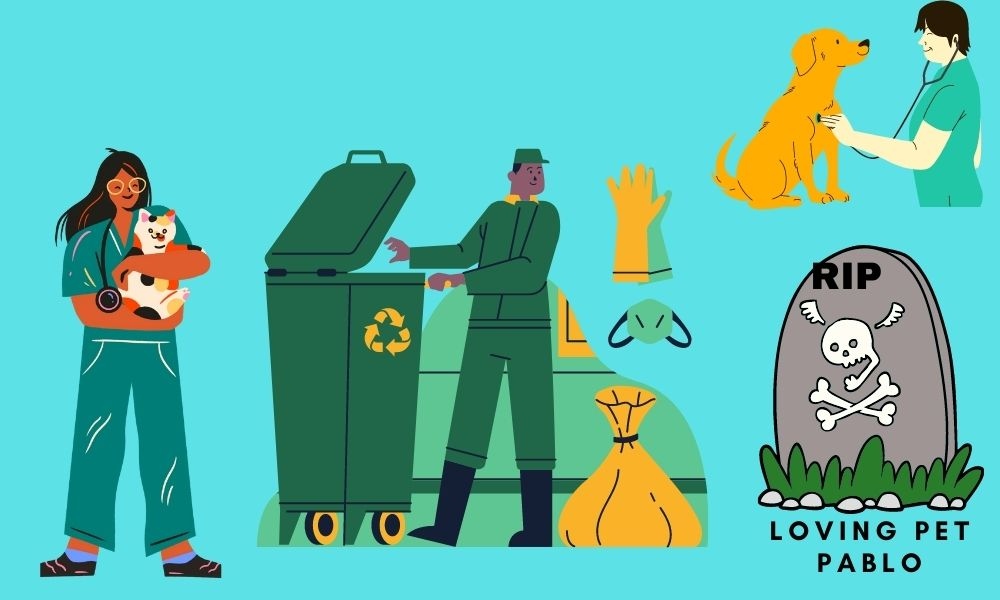No proper system for management of animal bio-medical waste from clinics and homes, says KSPCB.
Experts said that the unregulated disposal of animal biomedical waste in Bengaluru has serious environmental consequences and adds to the city’s escalating pollution. On the other side, the pet owners said that they don’t know about the proper disposal of animal waste.
“A few months ago, my pet Pablo was diagnosed with parvovirus, and around that time, my dog also harmed herself, so I had to bring the doctor to my home. He used to come to my house and cure her, then give us the waste to dispose of in dustbins, which we would do,” said Madhu Sree, a resident of Jaya Prakash Nagar.
Rahul, a resident of Electronic City said, “I got a puppy from a pet shop a few months ago, in January. After three weeks, it contracted parvovirus and died four days later. The replacement came from a breeder after the first died, and the second puppy also died. I buried both pets at a regular cemetery. I didn’t seek virus neutralization treatment for my dogs after they died since I wasn’t aware of it.”
Gayatri Handanahal, lead organizer of Reimagine Waste, a waste management service organization, explained that the waste generated by veterinary facilities is not effectively controlled. “Every medical waste must be separated at the source, although this is not always the case. Even if a pet dies as a result of a sickness, no one cares about it. People must take their dogs to the veterinarian for viral denaturalization therapy so that the virus does not spread when the dead dog is buried. Various illnesses may be transmitted by animals that are dangerous to humans. It also impacts the environment,” she said.
According to biomedical waste standards, biomedical waste encompasses all liquid and solid waste generated by medical facilities and activities containing biological components like health care, clinical research, animal research, animal farms, deceased animals, and others
Waste disposal
Animal waste that comes out of veterinary facilities and homes is also a part of a large amount of biomedical waste generation.
Lohitha, a veterinarian from Bangalore Pet House, Whitefield, does not accept the fact that veterinarians are mixing the animal biomedical waste with normal household waste while treating the pets at the house.
“When we treat the pets at their homes, we carry the biodegradable waste back to our clinic and dispose of it in our bio-degradable dustbin. We separate the animal waste into two dustbins at our place. She added that we give the animal biodegradable waste to a non-government organisation (NGO) and from there they manage the waste,” she said.
Dr Satya, veterinarian, at Neha Veterinary Clinic at Yelahanka New Town, said that animal waste is also considered biomedical waste.”It should also be managed properly, but our doctors themselves won’t pay proper attention to it,” he added.
Ramesh D Nayak, senior environmental officer (SEO), Karnataka State Pollution Control Board (KSPCB), said, “Karnataka has 236 animal homes and 3691 veterinary institutes.. We don’t have an application to organise animal waste as we do for waste disposal for health organisations. At waste management treatment plants, I believe animal bio-waste is mixed with biomedical hospital waste. To be honest, he added, no one properly manages bio-medical waste. At the animal homes, neither the segregation of animal biodegradable waste nor the management of biomedical waste is done adequately.”
According to Dr Yellapa Reddy, an environmentalist from Bangalore Environment Trust, said that neither the hospital administration nor the animal houses care about biomedical waste.
“A collector gets there and gathers it, which is then deposited without being separated. Nobody is concerned about bio-medical waste. There is a rule that stipulates the pollution control board should monitor it and take action if it is not discarded correctly in every hospital, but the committee has not been constituted. Members of the committee should observe how it is run, he added.”




